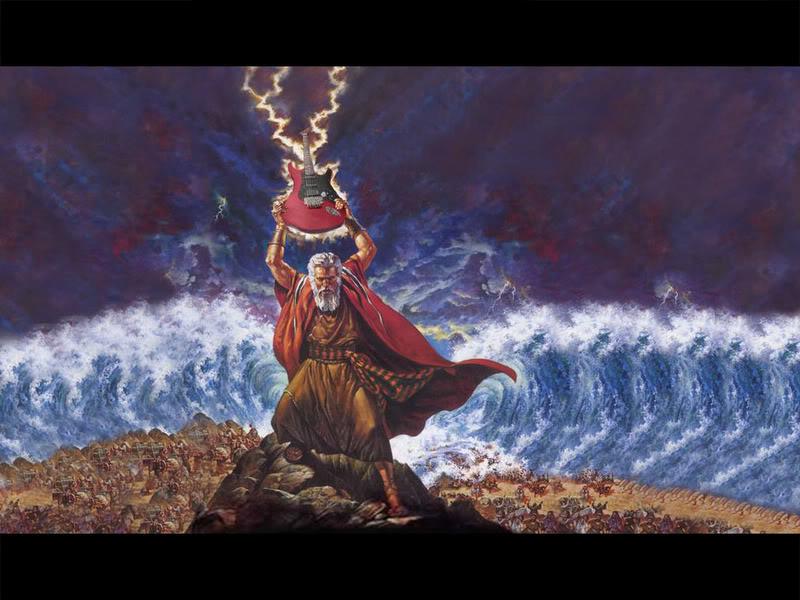-
Posts
12210 -
Joined
-
Last visited
-
Days Won
191
Reputation Activity
-
 The Folk Prophet got a reaction from JohnsonJones in Schisms in the Church
The Folk Prophet got a reaction from JohnsonJones in Schisms in the Church
You know they have drag events for "all ages' in Provo too, right?
-
 The Folk Prophet got a reaction from LDSGator in Marvin Gaye v. Ed Sheeran
The Folk Prophet got a reaction from LDSGator in Marvin Gaye v. Ed Sheeran
Well, there might "only" be seven "basic" plots, but there are unlimited plots.
-

-
 The Folk Prophet got a reaction from LDSGator in Marvin Gaye v. Ed Sheeran
The Folk Prophet got a reaction from LDSGator in Marvin Gaye v. Ed Sheeran
You don't.
You do make sure you aren't purposefully copying. But there's no mitigation for unknowingly being similar. You can't know what you don't know.
-
 The Folk Prophet got a reaction from Carborendum in Marvin Gaye v. Ed Sheeran
The Folk Prophet got a reaction from Carborendum in Marvin Gaye v. Ed Sheeran
Nah. I'm just glad to hear you realize there are some. I think the lawsuit is beyond stupid. But there are also clear similarities. I mean the first line (four or five notes) of both songs is like one note (interval) difference, (keyed differently though), if I recall. Still not enough to justify the suit.
-
 The Folk Prophet got a reaction from LDSGator in Marvin Gaye v. Ed Sheeran
The Folk Prophet got a reaction from LDSGator in Marvin Gaye v. Ed Sheeran
You can't hear the similarity between the melody lines?
-
 The Folk Prophet reacted to Carborendum in The Chosen - A Review
The Folk Prophet reacted to Carborendum in The Chosen - A Review
So, I saw a scene that is closer to what (I think) you might be describing. Jesus is given a robe or cloak of some sort, for which he is very grateful. As he puts it on, he jokingly says, "I could fit all of you in this" or something to that effect.
Maybe he could because, miracles. But he was clearly joking. Again, it could be thought of as a figure of speech signifying that it was very large.
-
 The Folk Prophet got a reaction from NeuroTypical in Poll: The animal species with the cutest babies is...?
The Folk Prophet got a reaction from NeuroTypical in Poll: The animal species with the cutest babies is...?
-

-
 The Folk Prophet reacted to LDSGator in Vivek Ramaswamy?
The Folk Prophet reacted to LDSGator in Vivek Ramaswamy?
The lobbying branch of the NRA was created in 1975, and while they might have had that goal in the past, the democratic party in 1965 was hardly progressive on race. So if you want to open that door, you can, but I’m not sure that’s in your sides best interest.
American leftists are very squirmy on guns. They fail to comprehend that the best way to stop a race based attack is to carry a 9mm. Same with LGBTQ rights advocates, womens rights advocates etc
-
 The Folk Prophet reacted to Vort in The Atonement as a mechanism to bring us together to feast?
The Folk Prophet reacted to Vort in The Atonement as a mechanism to bring us together to feast?
The mechanics of Christ's atoning sacrifice cannot possibly be understood without understanding exactly what the atonement of Jesus accomplishes. We understand that it brings us back to God, but what exactly does that mean, and how is it accomplished? These things form a part of "the mystery of Godliness", about which Elder McConkie said:
Is God omnipotent, omniscient, and omnipresent, or are these descriptive designations part of the legends of sectarianism?
Are there three gods or one? Why does Jesus say his Father is greater than he, and Paul say Jesus is equal with the Father? Why the great scriptural emphasis on proclaiming that three gods are one, and that the Lord our God is one Lord?
What of the mystery of our Lord’s birth? Indeed, why should God even have a son? Is Jesus the Son of Man, or the Son of God, or is there a difference? Was it necessary to have a Savior and Redeemer, or is the Koran correct in teaching that God had no need for a son because Allah has but to speak and a thing is done?
By what power could Jesus atone for the sins of the world, or rise from death’s dark tomb, or ascend physically into heaven? Is the atonement truly infinite and eternal, applying to all worlds and all created things?
...
All these are but sample questions, questions that raise some of the issues relative to the mystery of godliness.
...
Gospel truths are known and understood only by the power of the Spirit. Eternal life—which is to know God—is such an infinitely great reward that men must study, ponder, and pray, with all their hearts, to gain the needed knowledge.
The Lord gives his truths line upon line and precept upon precept to those who believe and obey. Saving truths come by revelation to prophets, not by reason to false priests or doctors of debate, dissension, and divisiveness.
...
As we walk the razor’s edge—the razor that divides truth from near truths, which sometimes have a pleasing attraction—let us be mindful of these words of the Prophet Joseph Smith: “The Savior has the words of eternal life. Nothing else can profit us. . . . I advise all to go on to perfection, and search deeper and deeper into the mysteries of Godliness” (Teachings, p. 364).
The whole talk is very well worth reading and/or listening to.
For me, the bottom line is that we can and, eventually, must understand these things, but much of that understanding will likely be given us in the life to come. I suspect few of us will develop in this life sufficiently that we can actually grasp many of these things. That's not to say they are beyond understanding; they are not. But they may well be beyond our understanding today, right now, and even in this life. Let us in any case not decide that if we do not/cannot understand these things, that therefore means that these things are untrue or forever beyond us—or worse, that we can assign whatever meaning we like to these things, especially if such assignments please the world and make us more acceptable to the world.
-
 The Folk Prophet reacted to zil2 in The Atonement as a mechanism to bring us together to feast?
The Folk Prophet reacted to zil2 in The Atonement as a mechanism to bring us together to feast?
Welcome to ThirdHour, @rcthompson88!
While there might be something to be gleaned from part of the author's idea, I think it's important to note that the author is lacking the additional understanding we have through the restoration. Therefore, don't let it carry you away from a true understanding.
At first blush, I find myself uncomfortable mixing the words "festive" and "Atonement" together - there wasn't really anything "festive" about it in my mind. Glorious and merciful, and horrific and tragic, sure, but festive?
If Christ's suffering and death were not necessary to atone for our sins, then, what? Are we to believe they were pointless or needless? Just a fluke of the culture? We are taught they were necessary. Whether they constitute a 1-to-1 substitution for our own seems unnecessarily mathematical and legalistic - as pointless a discussion as the number of angels dancing on the head of a pin. Christ himself tells us that he suffered so that we would not have to, if we would repent:
Just because the type or symbol wasn't needlessly tortured (it was a symbol, after all, and not exactly a willing or understanding participant), does not argue against the reality or meaning of all the Savior did. The animal's suffering wouldn't have helped anything (and may well have damaged the psyche of those instructed to carry out the torture). The sacrifice was simply a reminder of what would one day happen. It was an instructional aid. And it was the faith (in that future sacrifice) that gave it meaning, not the suffering or death or other ritualistic elements - those were just there for reminders and to give the Israelites a way to obey, IMO.
All that said, we do celebrate, at Easter, both the fact that our Lord atoned for our sins and the fact that he completed that act through his resurrection. And I expect many a family feasts at Easter. This last conference, we were asked to create more and more meaningful / appropriate Easter traditions in our families, and a few here have posted about having their own Seder...
Those are my initial reactions to the ideas presented, FWIW.
-

-
 The Folk Prophet got a reaction from Just_A_Guy in Request for assistance
The Folk Prophet got a reaction from Just_A_Guy in Request for assistance
I do all my apostasy naked.
-
 The Folk Prophet got a reaction from askandanswer in Request for assistance
The Folk Prophet got a reaction from askandanswer in Request for assistance
I do all my apostasy naked.
-
 The Folk Prophet reacted to Vort in Request for assistance
The Folk Prophet reacted to Vort in Request for assistance
I mean, if you're going to do apostasy, might as well go all in.
(EDIT: For the record, I don't really believe that.)
-

-
 The Folk Prophet got a reaction from Vort in One of my favorite Joseph Smith commentaries & from this weeks CFM
The Folk Prophet got a reaction from Vort in One of my favorite Joseph Smith commentaries & from this weeks CFM
Apparently I ruined the joke by...not getting it.
-
 The Folk Prophet reacted to Still_Small_Voice in Any other Star Wars geeks excited?
The Folk Prophet reacted to Still_Small_Voice in Any other Star Wars geeks excited?
I tried Andor and got through several episodes. It was just too slow and empty for me. I got just past the prison break episode (I did like that one) and then gave up.
-
 The Folk Prophet got a reaction from Vort in One of my favorite Joseph Smith commentaries & from this weeks CFM
The Folk Prophet got a reaction from Vort in One of my favorite Joseph Smith commentaries & from this weeks CFM
It strikes me the distinction is tremendous. But there is a link to the two ideas related to infidelity that have meaning.
That being said, I remember when I was younger having two friends, good people, but who had to marry outside the temple because they got caught up in fornication temptations. Ultimately, after many failures to avoid it for the required amount of time to become worthy to marry in the temple, the decision was made to marry civilly so they didn't have to avoid it, and then be sealed in the temple a year later. They did so, and have been happily, faithfully, eternally married for decades since. They raised their family in the gospel, serve faithfully, have been true, etc., etc.
Obviously it would have been better to have done it right. I remember attending their non temple wedding and feeling like it was such a terrible thing. Now I look back at it.... differently. In the end...due to the choices they made moving forward...it can be argued that ultimately no harm was really done*. But it cannot be argued that the potential for harm was huge. But I just don't know if the same can ever be said of the theoretical adulterous situation.
*I'm not sure this argument would be correct. I'm just positing that the argument could be made. But either way, I'd say the harm from this situation was distinctly lesser than what would come from an adulterous foray.
-
 The Folk Prophet got a reaction from Still_Small_Voice in Any other Star Wars geeks excited?
The Folk Prophet got a reaction from Still_Small_Voice in Any other Star Wars geeks excited?
Star Wars has totally sucked lately. I'd be excited...but Disney has proved time and again that they'll ruin it. Again...and again...and again. They are totally incompetent.
-
 The Folk Prophet reacted to Just_A_Guy in Pew Studies LDS are Non-judgmental
The Folk Prophet reacted to Just_A_Guy in Pew Studies LDS are Non-judgmental
For whatever reason [to the extent that it’s possible to generalize about such things] Church members, including Elder McConkie himself, have seemed to largely be able to articulate and maintain their theological disagreements with the Catholic Church without those disagreements descending into personal animus towards individual Catholics.
Do I understand why Nephi’s and Moroni’s statements about a materialistic church in the last days that had only a warped shell of the doctrine of Christ and that loved riches more than people, could have application to (and perhaps even have been inspired by visions of) grand Catholic Church? Sure. Do I understand that some Catholics have done horrifying things in the name of their religion, and that even a lot of cardinals and popes were absolute stinkers? Yep. Do I see why Elder McConkie and other LDS leaders were so deeply frustrated at what the primitive church could have had and could have been, but which it lost/forfeited in favor of the Catholicism (and, in the east, Orthodoxy) that ultimately came to prevail in Europe and eventually throughout the world? Also, yes.
Then again: I’m currently posting from a train in Florence, Italy; and am gaining an increasing appreciation for the Catholic Church. Problematic though they were—the Roman Empire was almost-pure evil; and the Catholics (or their institutional forbears) ended Rome’s most heinous practices while preserving (to the extent economically, socially, and politically possible) much of its beauty and instilling hope, meaning, comfort, and a smattering of scriptural knowledge into the lives of their largely-illiterate, desperately poor members.
Churches build both physical and spiritual monuments. The spiritual monuments—the ones built in the life of each believer—pass away from our mortal view with each generation; the physical monuments can last for centuries or millennia and—if we are careless—eclipse the fact that the spiritual monuments ever existed at all. Elder McConkie lived and served at a time when the LDS Church was undeniably poor and the number of our temples could be counted on two hands and two feet (with perhaps a dozen of those perhaps worthy of being considered anything like “monumental”). But with over three hundred multi-million dollar temples on the drawing board or bearing our church’s name in our day, it’s probably healthy to make sure we are careful to keep the material aspects of our church solidly within their spiritual contexts.
-
 The Folk Prophet got a reaction from SilentOne in A General Authority Will Be Visiting Me This Saturday at My House
The Folk Prophet got a reaction from SilentOne in A General Authority Will Be Visiting Me This Saturday at My House
I rather wonder if that's somewhat the point. Kind of a "fake it 'til you make it" thing. But it does depend on how you look at it.
I think there's value in "faking it" if it comes from a point of view of trying and effort rather than hypocrisy. I think there's the idea fits in nicely with the concept of "the natural man is and an enemy to God...unless he puts off the natural man and yields to the enticing's of the Holy Spirit."
We're dual natured beings, right? We are going to be mortal, carnal beings. We put off that side of ourselves and "act" or "play" the part of being righteous.
Yes, "pretending" to be righteous would be hypocrisy, and would be a very bad thing. But "acting" righteous even when you feel wicked is not the same thing. It's a choice of effort, commitment, and intent. In that regard, "acting" or "playing" the part can be viewed very positively. I think a big part of that is whether the "act" is for others or not. If one is putting on an act for others without the trying it's hypocrisy. If one is putting on the act for themselves in a legitimate effort to become then it's call "practice".
But...yeah... even as I talked through my thoughts here, I've answered my own question a bit. I think "act" can be viewed as "pretense" or as simply "action". Whereas "play" kind of only means "pretense".
Just some thoughts I had.
-
 The Folk Prophet got a reaction from LDSGator in Doorbell ditching
The Folk Prophet got a reaction from LDSGator in Doorbell ditching
In retrospect it's a laugh. In the moment...so freaked out!
Things could have been SO much worse though. In reality...nothing happened. We just got scared. Something could have actually happened. Damage. Pain. Death. All in all, it was no big deal.
I mean the drunk guy obviously had some pain (blood everywhere), but I kind of figured that if it was just a bit of blood from a fight, he probably deserved it. (Especially when the apartments where we lived were honor-code bound BYU-associated housing).
-
 The Folk Prophet got a reaction from clbent04 in A General Authority Will Be Visiting Me This Saturday at My House
The Folk Prophet got a reaction from clbent04 in A General Authority Will Be Visiting Me This Saturday at My House
I rather wonder if that's somewhat the point. Kind of a "fake it 'til you make it" thing. But it does depend on how you look at it.
I think there's value in "faking it" if it comes from a point of view of trying and effort rather than hypocrisy. I think there's the idea fits in nicely with the concept of "the natural man is and an enemy to God...unless he puts off the natural man and yields to the enticing's of the Holy Spirit."
We're dual natured beings, right? We are going to be mortal, carnal beings. We put off that side of ourselves and "act" or "play" the part of being righteous.
Yes, "pretending" to be righteous would be hypocrisy, and would be a very bad thing. But "acting" righteous even when you feel wicked is not the same thing. It's a choice of effort, commitment, and intent. In that regard, "acting" or "playing" the part can be viewed very positively. I think a big part of that is whether the "act" is for others or not. If one is putting on an act for others without the trying it's hypocrisy. If one is putting on the act for themselves in a legitimate effort to become then it's call "practice".
But...yeah... even as I talked through my thoughts here, I've answered my own question a bit. I think "act" can be viewed as "pretense" or as simply "action". Whereas "play" kind of only means "pretense".
Just some thoughts I had.













